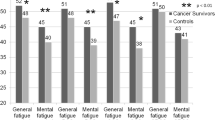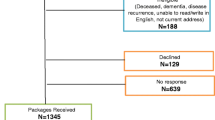Abstract
Rationale
Fatigue is a frequent complaint of women with cancer. However, the incidence of fatigue has not been well studied, in particular gynaecological cancer, which despite its prevalence has received minimal investigation.
Goals of work
The study aims were (1) to explore the symptoms experienced in a gynaecological cancer population, primarily fatigue and (2) to determine the acceptability of a fatigue questionnaire for use in a longitudinal survey.
Patients and methods
Over the course of 1 month, women with gynaecological cancer attending a Regional Cancer Centre completed a demographic and symptom questionnaire and the Multidimensional Fatigue Symptom Inventory—Short Form (MFSI-SF).
Main results
Of the 32 individuals approached, 30 agreed to participate (mean age, 61 years; the most common treatment received was surgery followed by chemotherapy n=11; mean time from commencement of treatment, including surgery = 3 months). All participants completed the MFSI-SF. Tiredness was the most commonly reported symptom, experienced by 90% of subjects and the most frequently stated worst symptom, reported by 23.3%. Furthermore, 23 of 27 subjects reported that tiredness interfered completely with their daily living. The MFSI-SF mean total fatigue score was 14.4 (SD 15.9), ranging from −15 to 50. The possible total fatigue score ranges from −24 to 96.
Conclusion
Despite the heterogeneous nature of the group, all participants completed the MFSI-SF. The study suggests that fatigue could be a problem for this population group. Thus, a longitudinal survey using the MFSI-SF to investigate the phenomenon further would appear feasible and justified.
Similar content being viewed by others
References
Alhberg K, Ekman T, Gaston-Johansson F, Mock V (2003) Assessment and management of cancer-related fatigue in adults. Lancet 362:640–650
Broeckel JA, Jacobsen PB, Horton J, Balducci L, Lyman GH (1998) Characteristics and correlates of fatigue after adjuvant chemotherapy for breast cancer. J Clin Oncol 16:1689–1696
Curt GA (2001) Fatigue in cancer. BMJ 322:1560
Jacobsen PB, Hann DM, Azzarello LM, Horton J, Balducci L, Lyman GH (1999) Fatigue in women receiving adjuvant chemotherapy for breast cancer: characteristics, course and correlates. J Pain Symptom Manage 19:14–27
Jacobsen PB, Thors CL (2003) Fatigue in the radiation therapy patient: current management and investigations. Semin Radiat Oncol 13:372–380
Morrow GR, Andrews PLR, Hickok JT, Roscoe JA, Matheson S (2001) Fatigue associated with cancer and its treatment. Support Care Cancer 10:389–398
National Cancer Institute (2003) Fatigue [online], National Cancer Institute. Available from: http://www.cancer.gov/ (accessed 8 July 2003)
Schwartz AH (2002) Validity of cancer-related fatigue instruments. Pharmacotherapy 22:1433–1441
Stein KD, Martin SC, Hann DM, Jacobsen PB (1998) A multidimensional measure of fatigue for use with cancer patients. Cancer Pract 6:143–152
Stein KD, Jacobsen PB, Blanchard CM, Thors C (2004) Further validation of the Multidimensional Fatigue Symptom Inventory—Short Form. J Pain Symptom Manage 27:14–23
Stone P, Richardson A, Ream E, Smith AG, Kerr DJ, Kearney N (2000) Cancer-related fatigue: inevitable, unimportant and untreatable? Results of a multicentre patient survey. Ann Oncol 11:971–975
Stone P, Richards M, A’Hern R, Hardy J (2001) Fatigue in patients with cancers of the breast and prostate undergoing radical radiotherapy. J Pain Symptom Manage 22:1007–1015
Stone P (2002) The measurement, causes and effective management of cancer-related fatigue. Int J Palliat Nurs 8:120–128
Visvosky C, Schneider SM (2003) Cancer-related fatigue. Online J Issues Nurs 8:8
Acknowledgements
This study was supported by a research grant from the Department of Employment and Learning (Northern Ireland). The authors would like to thank the staff of the Belfast City Hospital Trust for their help during data collection, and those who took part in the study for their time and effort.
Author information
Authors and Affiliations
Corresponding author
Rights and permissions
About this article
Cite this article
Prue, G., Rankin, J., Cramp, F. et al. Fatigue in gynaecological cancer patients: a pilot study. Support Care Cancer 14, 78–83 (2006). https://doi.org/10.1007/s00520-005-0830-7
Received:
Accepted:
Published:
Issue Date:
DOI: https://doi.org/10.1007/s00520-005-0830-7




